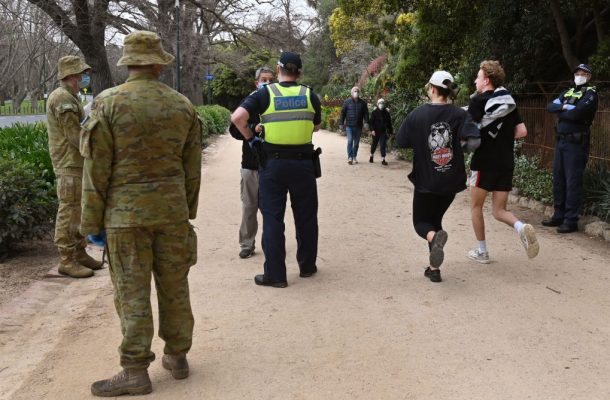Protecting Australia – and what makes us Australian

As the 20th anniversary of the 9/11 attacks approaches, Australians have seen their civil liberties and their community cohesion increasingly securitised and viewed as secondary to the need to prevent violence.
Despite our efforts to promote unity and to deny the world’s divisive cultural, political and ideological conflicts fertile ground to spawn hatred in Australia, old and new divisions remain deeply rooted in our multicultural society. Dealing with the Covid-19 pandemic threatens to further fracture and fragment our understanding of civil liberties and national security and how to protect them both.
Good intentions, major investment and considerable thought have been given to both liberties and the national security landscape, but Australia must do more to safeguard those freedoms while providing robust national security responses to threats.
Generations of Australians have come of age during the war on terror with little choice but to accept Australia’s role in overseas conflicts. The erosion of civil liberties in the name of security is normalised for most. We all want to be safe.
Overseas conflicts and threats have impacted our domestic security in ways that were previously unimaginable for most Australians. The world is increasingly unpredictable and subject to the actions of powerful non-state actors, rogue states, a resurgent Russia and an assertive China. Good intentions and optimism can’t spin this reality, but let’s take a closer look at what Australia is working with here.
We are witnessing a trade and economic tug of war with China while the Chinese Communist Party intensifies the mass surveillance and internment of Uyghurs and other Muslim minorities in Xinjiang.
As the last Australian troops returned from Afghanistan, schoolgirls were murdered in a Kabul bombing and Afghan civilians who helped Australia were targeted by the Taliban.
Adherents to right-wing ideologies continue to push the boundaries of ‘free speech’, finding a path between advocating political violence and expressing a political opinion which is protected in our constitution.
The past decade has given birth to extraordinary changes in Australia’s national security landscape. False battle lines are drawn with binary choices between national security and civil liberties and, more recently, trade and national security.
While acknowledging that Indigenous deaths in custody in Australia must be addressed, Prime Minister Scott Morrison said of a Black Lives Matter march that Australians should not be ‘importing the things that are happening overseas to Australia’.
Issues such as black deaths in custody, the indefinite detention of refugees, the Palestinian and Israeli conflict, and the political awareness and participation of young people are not being imported to Australia—they are already here. Recently, at least 10,000 people marched in Sydney to support Palestine, and Hezbollah flags were flying.
The pandemic has further fragmented our idea of nationhood and what Australia offers its citizens. Covid-19 has had a disproportionate impact on vulnerable communities and people from low socioeconomic backgrounds.
Young people have faced disruptions to their education and restrictions on their movements, domestically and internationally, while their job prospects have withered away. They have seen protestors prosecuted under public health orders and Australian citizens stranded overseas.
Balancing civil liberties and national security has always been a delicate task—and it’s even more so in a pandemic.
Covid-19 has given rise to extraordinary emergency powers that would previously have been unacceptable to Australians.
Many will see the government’s investment of $1.9 billion in law enforcement and intelligence agencies as a means to protect and safeguard citizens while protecting the freedoms that make Australia a democratic and pluralistic state.
But in late 2019, in a report by international civil rights organisations, Australia was quietly downgraded from an ‘open’ democracy to a ‘narrowed’ one, placing us on a par with Ghana, Botswana and the United States.
Before the Covid-19 crisis, trust in our civic institutions and governments was at an all-time low. There has been some improvement in trust over the past year in response to the government’s handling of the pandemic. Arguably, improved trust based on Covid-19 success will be fragile and sensitive to changes in performance.
Furthermore, improvements in community trust in government were not universal. Marginalised communities often bear, or at least perceive that they bear, the brunt of national security, law enforcement and intelligence policies. Among these communities, trust in the government to protect basic rights and freedoms is not nearly as strong. We remain one of the few democracies without a bill of rights.
Australia is already conducting secret trials behind closed doors and allowing law enforcement raids on journalists’ homes and on our national broadcaster.
In this tumultuous environment, many pockets of individuals, families, groups and communities in Australia feel disengaged from mainstream Australia because of their geopolitical, generational, religious and political beliefs and values. It’s likely that many feel that their voices and perspectives are not listened to or prioritised because of their differences from mainstream Australia.
Disengagement from political, community and civic institutions across the political and religious spectrums is increasingly seen as a legitimate act of rebellion and protest rather than an abrogation of a citizen’s obligations towards their country.
While not everyone who experiences diverse challenges and dislocation becomes susceptible to extremist ideologies, most of those who believe in these ideologies are influenced by such inequality.
Covid-19 has demonstrated that our domestic security and civil liberties framework at home is not immune from what happens overseas. Nor, in a globalised world, can we ignore the interconnectedness of social justice issues.
The bifurcation of ‘local’ and ‘overseas’ issues undermines community cohesion and civil liberties at home, but that’s not an excuse for the securitisation of either our freedoms or cohesion. The alignment of community cohesion with counterterrorism in this context is ironic.
The danger is that we won’t be any safer in another two decades unless we start to address the weaknesses in our responses to threats to both national security and civil liberties and to truly understand the interconnectedness of these issues, especially in the context of Covid-19.
Security and civil liberties have a symbiotic relationship that collectively contributes to Australia’s social cohesion. It seems that after two decades it’s time for government to work with Australians to map out the red line between security and civil liberties.
The gold standard for such an effort is a bill of rights. Of course, developing an Australian bill of rights would likely take several years. In the interim, the government needs to find mechanisms that give a voice to those who feel marginalised.
These efforts need to meaningfully ensure that marginalised individuals, groups and communities have the sense that they are being listened to, even if the messages or demands can’t be met.
A good starting point could be separating the government’s functions relating to promoting social cohesion and countering violent extremism functions from its law enforcement, intelligence and national security agencies.
This article was written by Lydia Shelly, a lawyer and principal of Shelly Legal, a community advocate and a member of the New South Wales Council for Civil Liberties; and John Coyne. It was published by The Strategist.
John Coyne is the head of the ASPI border security programme. He spent 20 years as an intelligence professional at tactical, operational, and strategic levels across a range of military, regulatory, national security and law enforcement organisations, primarily in the ASEAN region.













